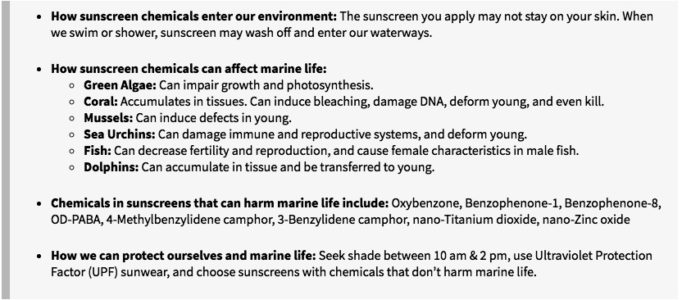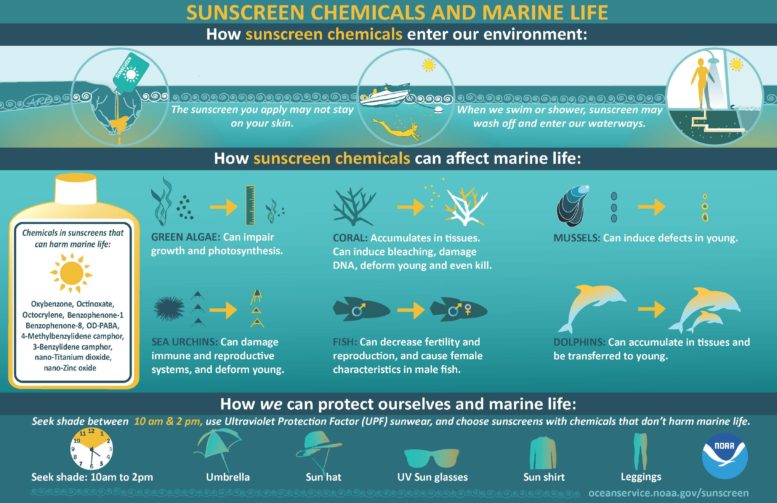The common chemicals used in thousands of products to protect us against harmful effects of ultraviolet light, threaten corals and other marine life.
Healthy coral reefs are one of the most valuable ecosystems on Earth. They provide billions of dollars in economic and environmental services, such as food, coastal protection, and tourism. However, coral ecosystems around the world face serious threats from a number of sources, including climate change, unsustainable fishing, land-based pollution, coastal development, disease, and invasive species.
Recently, scientists have discovered that some of the chemicals found in sunscreen and other personal health products also threaten the health of coral reefs. Two of those studies, led by NOAA researchers and partners, are detailed below. How these, and other compounds, affect reef ecosystems remains an active area of research among scientists.
Effects of the Sunscreen UV Filter, Oxybenzone (Benzophenone-3)
In a 2016 study, a team of international scientists found that a common chemical in many sunscreen lotions and cosmetics is highly toxic to juvenile corals and other marine life. Oxybenzone, or BP-3, is found in more than 3,500 skin care products worldwide for protection against the sun’s harmful effects. The compound has been found entering the environment both through wastewater effluent and directly from swimmers wearing sunscreens.
The study published in the Archives of Environmental Contamination and Toxicology Journal showed 4 major toxic effects in early developing coral: (i) increased susceptibility to bleaching; (ii) DNA damage (Genotoxicity); (iii) abnormal skeleton growth (via endocrine disruption); and (iv) gross deformities of baby coral.
The authors of the study conclude that nontoxic Oxybenzone alternatives are critical for protecting reefs and the exacerbating effects posed by climate change and bleaching.

Effects of the Skincare UV filter, Benzophenone-2
In a December 2013 study published in Ecotoxicology, NOAA National Centers for Coastal Ocean Science researchers and their partners had discovered that a sunscreen chemical commonly used in many soaps, cosmetics, and body fragrances is highly toxic to corals. The team’s data show that even very low concentrations of benzophenone-2, or BP-2, can quickly kill juvenile corals. BP-2 is an additive used in personal-care products since the 1960s to protect against the damaging effects of ultraviolet light.
The team also found that BP-2 causes colorful corals to bleach, and can potentially induce or increase the frequency of mutation in corals by causing damage to their DNA. BP-2 is not removed from most municipal wastewater treatment facilities. This discharge is often directly released into coastal waters of the Caribbean and Indo-Pacific, threatening near-shore coral reefs.
Although pollution is a major cause of coral reef degradation and the easiest factor to mitigate, BP-2 as a pollutant has largely been ignored, according to C.A. Downs, Lead Author of the study.
“In the case of BP-2 pollution, there are a range of options that can be considered for reducing its impact to reefs —from working with manufacturers and innovating more environmentally sustainable products, to educating consumers regarding product selection and product disposal,” C.A. Downs said.
